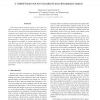Free Online Productivity Tools
i2Speak
i2Symbol
i2OCR
iTex2Img
iWeb2Print
iWeb2Shot
i2Type
iPdf2Split
iPdf2Merge
i2Bopomofo
i2Arabic
i2Style
i2Image
i2PDF
iLatex2Rtf
Sci2ools
130
click to vote
CVPR
2008
IEEE
2008
IEEE
A unified framework for generalized Linear Discriminant Analysis
Linear Discriminant Analysis (LDA) is one of the wellknown methods for supervised dimensionality reduction. Over the years, many LDA-based algorithms have been developed to cope with the curse of dimensionality. In essence, most of these algorithms employ various techniques to deal with the singularity problem, which occurs when the data dimensionality is larger than the sample size. They have been applied successfully in various applications. However, there is a lack of a systematic study of the commonalities and differences of these algorithms, as well as their intrinsic relationships. In this paper, a unified framework for generalized LDA is proposed via a transfer function. The proposed framework elucidates the properties of various algorithms and their relationships. Based on the presented analysis, we propose an efficient model selection algorithm for LDA. We conduct extensive experiments using a collection of high-dimensional data, including text documents, face images, gene ex...
Computer Vision | CVPR 2008 | Data Dimensionality | Gene Expression Pattern | Lda-based Algorithms | Supervised Dimensionality Reduction | Various Algorithms |
Related Content
| Added | 12 Oct 2009 |
| Updated | 12 Oct 2009 |
| Type | Conference |
| Year | 2008 |
| Where | CVPR |
| Authors | Shuiwang Ji, Jieping Ye |
Comments (0)

